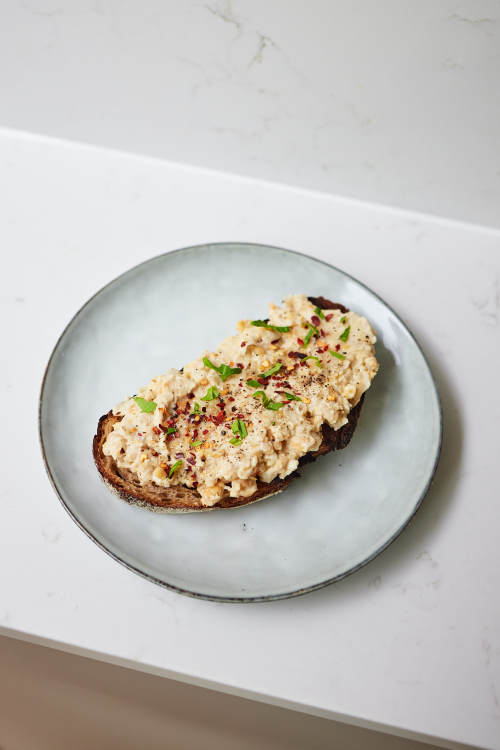Move over New Year’s resolutions, 2024 is the year of the healthy habit.
80% of people are not able to stick to their New Year’s resolutions by February and only 8% of people stick with them the entire year (1). With this in mind, I’m here to encourage you to commit and lean into the joy of making some key, nourishing health intentions which, with consistency, will turn into long-lasting habits. By committing to healthy habits that spark happiness you’ll naturally start to work with your body, create realistic balance in your life and improve your health overtime. Research (2) shows that adding small healthy habits to your everyday routine can reduce anxiety, stress, and increase productivity, so there really is everything to gain. Small improvements and tweaks to your everyday life will add up to something significant. If you’re committed and enjoy the process, the compound effect of these daily habits truly hold the power to have a profound impact on your health and wellbeing (3).
Replace the outdated new year’s resolution
By this, I mean swapping New Year’s resolutions for daily(ish) habits that don’t feel like a chore, or that zap the fun from your life like standard New Year’s resolutions tend to do. My guess is that most of us have probably experienced this in some way and have realised that strict sets of all or nothing ‘rules’, ultimately aren’t beneficial for our long-term health or wellbeing. Unattainable resolutions usually make us feel worse rather than better and can make us feel like we’re failing instead of positively pushing forward with our long-term goals.
Making your daily habits truly important and non-negotiable is all about cementing consistency and adopting a ‘what can I add to my lifestyle’ mindset. Strict New Year’s resolutions deprive us and take away from our lives (and our plates), whereas healthy habits energise and add to our day to day. This gentle mindset reframe is the key to laying the foundations to better health and wellbeing, and living a lifestyle you love.
When I look back on my own health journey, something that has helped me personally create long-lasting healthy habits is reframing the narrative and choosing to see my daily habits as something I ‘get’ to do for my health, instead of something I ‘have’ to do.
Cementing new habits in your life involves consistent effort and time. So, rather than setting challenging goals, focus on continuous improvement in your daily habits - you'll experience the benefits sooner than you might expect. If you find yourself feeling overwhelmed, consider adopting James Clear's "1% better" philosophy from his book Atomic Habits. This approach encourages making a 1% improvement each day, resulting in remarkable progress over the course of a year. Viewing habits through this lens makes the process feel a lot more manageable and realistic. With persistent consistency, your body and mind will naturally prompt you to stick to these habits, because of how much better they make your feel compared to when you don't do them.
Below I’m sharing 5 easy-to-integrate tips on how you can start to ease into a healthy, happy, and nourished 2024 by gradually creating a daily lifestyle built on the feel-good small stuff. Making it easy and enjoyable is key to making it work for you.
5 key healthy habits, built to last:
1. Commit to a single, non-negotiable morning ritual.
Whether it’s getting up 15-20 mins earlier than usual to move your body, meditating, or prioritising ample time to prepare and savour your breakfast instead of rushing or skipping it, choose one daily ritual that you want to establish above all else. This structured daily habit will set a calm tone for the day, and sends positive signals to both your body and mind that you are worth taking care of. Remember, cultivate positive, enjoyable habits.
2. Get to bed by 10pm to achieve more restorative sleep.
This will also increase production of melatonin (the "sleep hormone"). Going to sleep earlier plays a crucial role in regulating your sleep-wake cycle, leading to increased daytime energy and motivation, and improving sleep quality at night. Better sleep ultimately translates to enhanced overall health.
3. Plan your meals ahead & make one batch recipe per week.
This one weekly habit can be totally game-changing! Planning healthy meals ahead of the week is a great way to take control of your health. Knowing what you’re going to eat during the busy week will also save you stress, time, and will most likely cut your grocery costs too. Write it down on paper and pin it to your fridge, keep it on your phone, or use the Deliciously Ella weekly meal planner.
4. Incorporate 5 portions of vegetables daily, and aim for 30 different plant varieties each week.
Don’t let this number put you off, when you consider that ‘plants’ refers to vegetables, fruits, whole grains, nuts, seeds, herbs, and spices; achieving this goal is more manageable than it initially appears (4). Personally, I enhance my breakfast with a sprinkle of mixed seeds and add a cup of lentils or chickpeas to my main meals for a quick way to boost gut-feeding fibre and keep me feeling fuller for longer. This will naturally and effortlessly help you increase the nutrient-profile of your meals and therefore improve your overall health. More fibre means better gut health, and research shows that improved gut health means better overall health (5).
5. Increase your daily water intake, aiming for 1.5-2 litres a day (6).
Staying well-hydrated is among the simplest and most effective ways to boost wellbeing. Maintaining good hydration is connected to increased energy levels, improved concentration, and overall cognitive health (7). Keep in mind that herbal teas count towards your hydration target while also providing your body with additional nutrients and anti-inflammatories. Prioritising increased hydration will not only make you feel better physically but also mentally.
Reminders to keep you Grounded
Write these down in your journal to glance at when you need a boost, copy and paste them into the notes on your phone, or set as your screensaver for a daily reminder.
Don’t wait until the ‘right’ time. It will never come, the right time is now.
Don’t allow perfect to be the enemy of good. Protect yourself from the pressure of putting unattainable expectations on yourself to be perfect. For healthy habits that last, aim for 1% better in one area of your life and build slowly and steadily from there
Focus on the nutrition you can add to your plate, instead of what you ‘shouldn’t’ eat. By emphasising the inclusion of a diverse range of plants, you can positively enhance your diet, steering clear of negative, often restrictive, influences from January diet culture.
It’s never all or nothing. Be gentle and kind with yourself. Your nutrition is not based on one meal, one day, nor even one week.
Better health means better mental wellbeing. Never underestimate the power of going for a walking in nature, taking time away from your phone, spending time with a friend, taking a bath and an early night. Better health does not mean only eating more greens and drinking more water, it all counts.
Self-care isn’t selfish; it is, in fact, essential. There is no-one worth taking care of more than you. You can’t effectively support others when your own cup is empty. By consistently taking the time to fill your cup, you'll be better equipped to show up for the people in your life with greater presence.
Making your health and wellbeing a priority is the best investment you could possibly make and will positively impact all areas of your life.
Rather than give in to the pressures of New Year’s resolutions or the “new year, new me” mentality, it’s far more sustainable to think of 2024 as the year of the healthy habit, embracing the process of taking care of yourself with small, easy changes. Habits are personal, so experiment with a few over the next few weeks. You will know which habits will be here to stay, and which simply don’t suit you. If in doubt, remember habits should feel good; things you “get” to do which your mind and body will thank you for.
Jessica Shand, Naturopathic Nutritionist (NTP)
References
1. https://time.com/6243642/how-to-keep-new-years-resolutions-2/
2. Hobson NM, Bonk D, Inzlicht M. Rituals decrease the neural response to performance failure. PeerJ. 2017;5:e3363.
3. Dyer KA, Daily healthy habits to reduce stress and increase longevity. Journal of Interprofessional Education & Practice. 2023, 30.
4. Wang D, Li Y, Bhupathiraju S et al. Fruit and vegetable intake and mortality. Circulation. 2021, 143.17.
5. Rinninella E, Raoul P, Cintoni M, et al. What is the Healthy Gut Microbiota Composition? A Changing Ecosystem across Age, Environment, Diet, and Diseases. Microorganisms. 2019, 7.1.
6. https://www.nhs.uk/live-well/eat-well/food-guidelines-and-food-labels/water-drinks-nutrition/
7. Pross N, Demazières A, Girard N, et al. Influence of progressive fluid restriction on mood and physiological markers of dehydration in women. Br J Nutr. 2013, 109.2.












